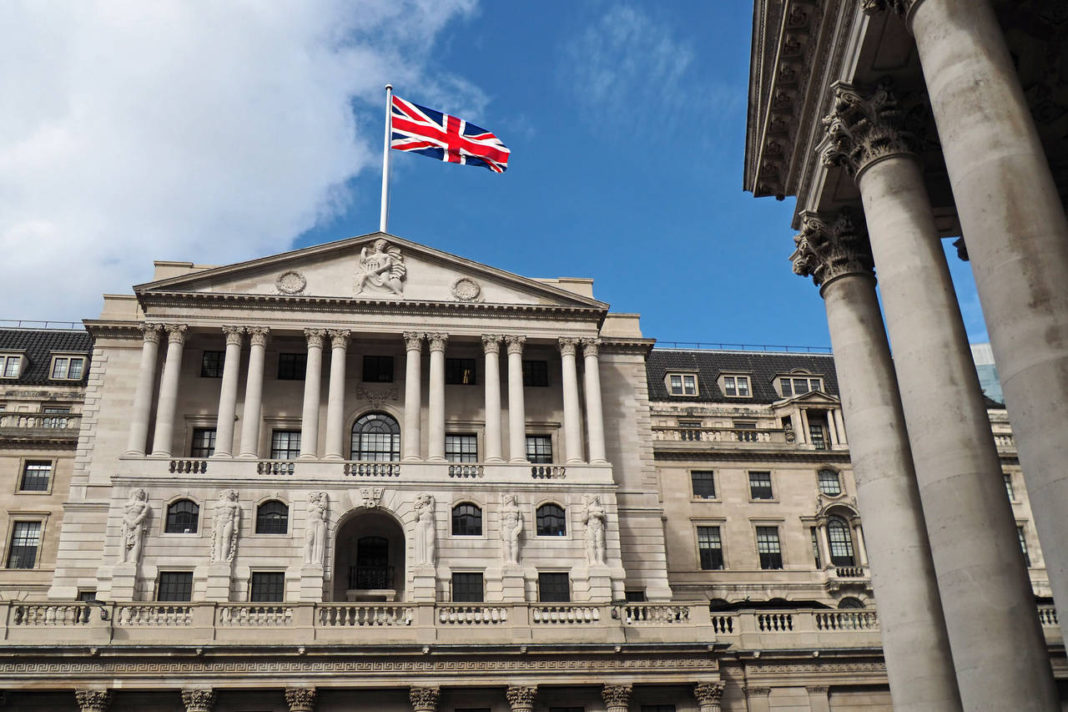The Bank of England raised interest rates to 0.5% on Thursday and nearly half of its policymakers wanted a bigger increase to contain rampant price pressures, as the British central bank warned inflation will soon top 7%.
In a surprise split decision, four of the nine members of the Monetary Policy Committee wanted to raise interest rates by half a percentage point to 0.75% in what would have been the biggest increase in borrowing costs since the BoE became operationally independent 25 years ago.
The majority, including Governor Andrew Bailey, voted for a 0.25 percentage point increase.
The pound jumped by around two-thirds of a cent against the dollar to above $1.36, its highest since Jan. 20. British government bonds sold off, with the 10-year yield hitting its highest level since January 2019.
“Although a quarter point rise may have a limited impact on most firms, many will view back-to-back rate hikes, and four Monetary Policy Committee members voting for a more significant rate rise, as a leap towards a sustained period of significant monetary tightening,” Suren Thiru, head of economics at the British Chambers of Commerce, said.
The move follows hot on the heels of a rate hike in December, marking the first back-to-back increases in Bank Rate since 2004 and reflecting urgency among MPC members to show they are on top of a growing cost-of-living crisis.
The BoE said consumer price inflation – which stood at 5.4% in December – now looks set to peak at around 7.25% in April, which would be the highest rate since the recession-ravaged early 1990s and miles off its 2% target.
Earlier on Thursday, British energy regulators raised the maximum bill for typical household usage by around 700 pounds to nearly 2,000 pounds.
In contrast with the approach taken by the European Central Bank, the BoE warned further “modest tightening” is in the pipeline, even though growth will be hurt by global energy and goods price inflation.
“Given the current tightness of the labour market and continuing signs of greater persistence in domestic cost and price pressures, all members of the Committee judged that an increase in Bank Rate was warranted at this meeting,” the minutes from the BoE’s Feb. 2 meeting said.
High inflation meant that post-tax income for working households would fall by 2% this year and 0.5% next year, while weakening demand would push unemployment up to 5% in three years’ time.
The BoE said it will start to unwind its 895 billion pounds ($1.2 trillion) quantitative easing programme by allowing its vast holding of British government bonds to roll off its balance sheet as they mature, while selling entirely its much smaller stock of corporate bonds.
Price pressures looks set to persist for much longer than forecast in November by the BoE, which trebled its forecast for wage growth this year to 3.75%.
Inflation in a year’s time now looks set to remain above 5% based on the market outlook for interest rates. But in a sign the BoE thinks investors have priced in too many rate hikes in future years, it predicted inflation in three years’ time would come in below target at around 1.6%.
Governor Bailey is due to host a news conference at 1230 GMT.
SPLIT DECISION
Bailey, his deputies Ben Broadbent and Jon Cunliffe, Chief Economist Huw Pill and external MPC member Silvana Tenreyro comprised the majority voting for a 25 basis point rate hike.
The BoE said they recognised the risks of strong price pressures but also the potential for inflation to fall faster than expected if global energy and goods costs ease as markets expect – rather than a more cautious BoE assumption.
They warned a larger rate hike could have an “outsized impact” on expectations for borrowing costs, which were already strong enough, if implemented, to push inflation below target in three years’ time.
Deputy Governor Dave Ramsden and external members Michael Saunders, Jonathan Haskel and Catherine Mann voted for a half percentage point rate rise.
“Monetary policy should tighten to a greater extent at this meeting in order to reduce the risk that recent trends in pay growth and inflation expectations became more firmly embedded and thereby help to bring inflation back to the target sustainably in the near term,” the BoE said of this group.
BOND SALES
The BoE said it would begin to unwind its asset purchases, accumulated over the last decade in attempts to stimulate the economy in a process known as quantitative tightening (QT).
This will start next month when a British government bond held by the central bank matures. The 27.9 billion pounds of proceeds will not be reinvested, the BoE said – and nor will future gilt redemptions, worth around 70 billion pounds over 2022 and 2023.
The BoE repeated its plan to consider actively selling gilts once Bank Rate hits 1%.
It also announced it plans to reduce its 20 billion pounds of corporate bond holdings to zero no sooner than the end of next year, through not reinvesting maturing bonds and a yet-to-be-announced sales programme
Source: Reuters.com
Reporting by Andy Bruce; Editing by Catherine Evans





